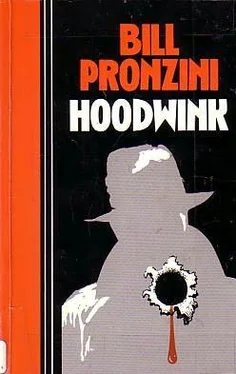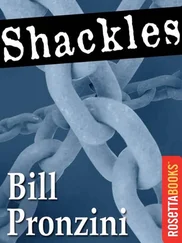Bill Pronzini - Hoodwink
Здесь есть возможность читать онлайн «Bill Pronzini - Hoodwink» весь текст электронной книги совершенно бесплатно (целиком полную версию без сокращений). В некоторых случаях можно слушать аудио, скачать через торрент в формате fb2 и присутствует краткое содержание. Год выпуска: 0100, Жанр: Криминальный детектив, на английском языке. Описание произведения, (предисловие) а так же отзывы посетителей доступны на портале библиотеки ЛибКат.
- Название:Hoodwink
- Автор:
- Жанр:
- Год:0100
- ISBN:нет данных
- Рейтинг книги:3 / 5. Голосов: 1
-
Избранное:Добавить в избранное
- Отзывы:
-
Ваша оценка:
- 60
- 1
- 2
- 3
- 4
- 5
Hoodwink: краткое содержание, описание и аннотация
Предлагаем к чтению аннотацию, описание, краткое содержание или предисловие (зависит от того, что написал сам автор книги «Hoodwink»). Если вы не нашли необходимую информацию о книге — напишите в комментариях, мы постараемся отыскать её.
Hoodwink — читать онлайн бесплатно полную книгу (весь текст) целиком
Ниже представлен текст книги, разбитый по страницам. Система сохранения места последней прочитанной страницы, позволяет с удобством читать онлайн бесплатно книгу «Hoodwink», без необходимости каждый раз заново искать на чём Вы остановились. Поставьте закладку, и сможете в любой момент перейти на страницу, на которой закончили чтение.
Интервал:
Закладка:
“I doubt if you could, Russ,” Ivan Wade said.
“Oh, is that so? Why not?”
“Because you’re an obnoxious drunk.”
“Hah?”
“Convention organizers aren’t interested in drunks. Neither are college faculties. And neither are the fans; they don’t care to watch sodden hacks stumbling around making fools of themselves.”
It got quiet among the five of us. Wade had spoken softly, evenly, but each of the words was like an arrow coated with venom. Dancer opened his mouth, closed it again as if he were still casting around inside his head for a suitable comeback. He had absorbed abusive remarks from Bo hannon and Cybil Wade and Ramsey, but they had each had a bantering quality; he could deal with a few harmless insults among old cronies. But he didn’t seem to know how to handle the real thing-a combination of dislike and disgust.
Ten seconds went away. And finally Dancer found words, so inadequate after all that silence that they were an anticlimax: “So I’m a drunk and a hack, Ivan, so what?”
“So nothing,” Wade said. “So you’re a drunk and a hack, that’s all.”
Dancer did not get angry, or laugh, or shrug it off. Wade’s words seemed to have cut deep inside him, sliced into a nerve somewhere. Pain showed on his face, but it was not self-pity this time-it was hurt just as genuine as Wade’s disgust, a reflection of the festering spiritual anguish that had made him a drunk in the first place.
His eyes shifted away from Wade, flicked over Ramsey and Praxas to me, and then focused downward on the empty glass in his hand. Without saying anything, he turned from us and went to the bar.
Ramsey said, “You put it into him kind of deep, didn’t you, Ivan?”
“Did I?” Wade said. He shrugged, his face impassive. “If you’ll all excuse me …” And he went away too, over toward the windows.
“What was that all about?” I asked Ramsey and Praxas. “Something between the two of them?”
“You could say that,” Ramsey answered.
“Mind if I ask what it is?”
“It’s a long story,” Praxas said. “And ancient history.”
Which meant that he didn’t want to discuss it. Neither did Ramsey, judging from his expression. So I let it drop; it was none of my business, really. Unless it had a bearing on the extortion business, and that seemed doubtful.
Dancer came back from the bar with a fresh drink. But he didn’t rejoin the three of us; he plopped himself down in a chair not far away and stared out at the mosaic of city lights. Then, almost at once, he began to sing. Not in the loud boisterous way of most drunks at a party; in a subdued and dolorous voice that barely carried to where we were standing. I could just make out the words-the same four-line, mostly Spanish verse over and over, not so much a song as a chant. Or a lament.
“No tengo tabaco, “No tengo papel, “No tengo dinero - “Goddammit to hell. While the three of us were listening to that, not saying anything, Jim Bohannon came wandering over. He stopped beside me, cocked his head in Dancer’s direction, and said to Praxas, “Some things don’t change much in thirty years, I reckon.”
“Apparently not.”
Ramsey saw me looking puzzled. “Russ used to recite that verse at Pulpeteer meetings,” he said, “every time he dived into the sauce. Drunker he got, the more he’d feel sorry for himself; and the sorrier he felt, the more he’d recite. Used to drive us crazy.”
“Well, at least he’s learned to be quiet about it,“Bohannon said.
I asked, “Did he make it up himself?”
“No. It’s an old cowboy lament, from down along the Mexican border-”
There was a sudden commotion behind us, in the center of the room: loud voices and the sound of glass shattering. Bohannon and I both spun around; all the party noises seemed to stop at once, including Dancer’s singing. Twenty feet away two men stood facing each other, a broken highball glass and a streak of wetness and melting ice cubes like a dividing line on the carpet between them. One of the men was the scrawny ex-editor, Frank Colodny. The other one I didn’t know; he was a dusty, sixtyish guy wearing hornrimmed glasses and an ancient sports jacket with elbow patches.
Colodny had his right hand up, forefinger extended and shaking within an inch of the other guy’s chin. His face was congested and his eyes had bright, hot little lights in them. “Stay the hell away from me, Meeker, I’m warning you.”
“Say that a little louder,” the man named Meeker said. He looked just the opposite of Colodny-calm and coldly deliberate. “Let everybody hear it.”
“You crazy bastard-”
“Louder, Frank. Louder.”
Colodny seemed to have a belated awareness of his audience; he lowered his arm, licked his lips, and backed off a step. Then he clamped his lips together, made them disappear into a thin white slash. And swung around and stalked out of the suite, brushing past a startled-looking Lloyd Underwood who had hurried in and was half blocking the entrance.
The other man, Meeker, watched him go with a faint, humorless smile plucking at the corners of his mouth. When Colodny had disappeared, Meeker sat on his heels and began to pick up the broken shards of glass. And as if that was a cue for the rest of us, the frozen tableau dissolved and people began moving around and talking again, letting the mood of the party regenerate like new skin over a minor wound.
“No tengo tabaco, “No tengo papel …”
Bohannon said, “Now what the devil is Frank so heated up about?”
“That’s a good question,” Praxas said. “He seemed jittery and upset when he got here.”
I asked, “Who’s the fellow named Meeker?”
“Ozzie Meeker. An oldtimer like us.” ‘“A writer? I don’t recognize the name.”
“No. An artist,”
“He worked with Frank at Action House in the forties,” Ramsey said. “Did most of the detective and Western covers, and some of the interior black-and-whites.”
“His name wasn’t in the convention brochure, was it?”
Praxas shook his head. “I understand Lloyd Underwood wasn’t able to locate him until after the brochures were printed. But he’s exhibiting some of his work in the Art Room.”
“Nostalgia got to him, same as it got to us,” Bohannon said. “He was one of us for a while, you know.”
“The Pulpeteers, you mean?” I asked.
“Right. He started coming to meetings in the late forties, after he went to work for Action House. He and Colodny were always friendly back then. Wonder what set them off now, after all these years?”
Nobody seemed to know.
“No tengo dinero - “Goddammit to hell …”
The little group we made began to break up one by one. Ramsey drifted off to the bar for another drink; Bohannon’s wife, a pleasant gray-haired lady, came over and got him and took him away to meet someone; and one of the convention organizers, or maybe just a fan, collared Praxas and began asking him questions about The Spectre’s sex life. Which left me standing by myself, listening to Dancer sing his monotonous little lament. And wondering about things like the.38 in Cybil Wade’s purse, Dancer’s dislike for Colodny, the sudden tension between Colodny and Meeker, the deeper-seated tension between Dancer and Ivan Wade.
Not that there was much point in my worrying about any of it. I had no particular desire to involve myself in a lot of private, thirty-year-old interrelationships among ex-pulp writers. Despite what Dancer had gone around telling people, the old lone wolf was here to enjoy himself more than he was here to work at detection.
And one of the ways I might like to enjoy myself started toward me just then, smiling in her frank, attractive way.
Читать дальшеИнтервал:
Закладка:
Похожие книги на «Hoodwink»
Представляем Вашему вниманию похожие книги на «Hoodwink» списком для выбора. Мы отобрали схожую по названию и смыслу литературу в надежде предоставить читателям больше вариантов отыскать новые, интересные, ещё непрочитанные произведения.
Обсуждение, отзывы о книге «Hoodwink» и просто собственные мнения читателей. Оставьте ваши комментарии, напишите, что Вы думаете о произведении, его смысле или главных героях. Укажите что конкретно понравилось, а что нет, и почему Вы так считаете.












